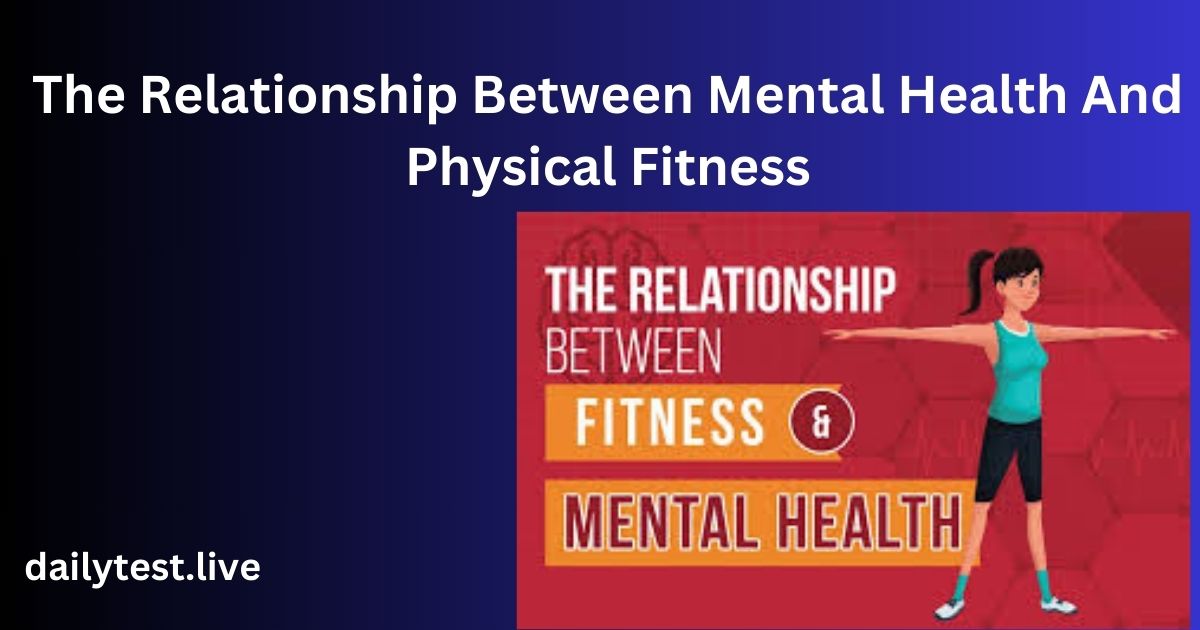The Relationship Between Mental Health And Physical Fitness Connection between health and fitness has always been a keen issue in recent times. In these days of awareness of mental illness and the ills of sedentary lifestyles, it is therefore important to see how these two aspects connect. Exercise fits in the body and mind of the individual as a fitter body leads to fitter minds. In this blog post, I further tackle the relationship between physical health and psychiatry to explain how exercise impacts mood and various conditions.
The Impact Of Physical Fitness On Mental Health
This paper aims to investigate this relationship between physical fitness and mental health and the elements that support it. Advantages of exercising for exercising as regards mental health entail the fact that exercise releases endorphins which make one feel good and at the same time decreasing the level of cortisol in the body. Regular exercising helps to reduce the symptoms of depressions and anxieties improve levels of cognitive abilities and boosts the rate of self esteem & The Relationship Between Mental Health And Physical Fitness.
Physical Activity and Mood Enhancement
It should be noted that physical fitness is not synonymous to muscle mass or body fat rate; it is beneficial to the mind. Frequent exercise can produce natural substances called endorphins which act as natural mood enhancers. This release of endorphins has a beneficial effect in terms of easing stress and anxiety and symptoms of depression. In addition, physical exercise helps people to sleep better which is very crucial to brain functioning. Exercising for instance running or even just a stroll in the park has an immediate impact on boosting mood as well as long term impacts on one’s mental health.
Stress Reduction Through Exercise
Another noteworthy factor that has actual work playing a natural stress reliever is its ability to eliminate the levels of cortisol in the body as this is the body’s main stress hormone. Furthermore, it improves the endorphin levels and therefore influences the emotions of relaxation and positivity. Mental exercises – such as high intensity interval training, gentle yoga, and meditation – may help reduce mental health symptoms of stress.
Exercise and Cognitive Function
Nowadays, it is demonstrated that physical exercise can have positive impact upon the brain. Aerobic exercises can strengthen the brain and improve concentration, and mental health. This is attained because of the massive circulation of blood to the brain through the body to facilitate new growth of neurons and consequently improved brain function. Aerobic exercises such as swimming and running, as well as lifting weights and walking, for example, can all improve cognitive functioning.
The Role of Exercise in Managing Anxiety
Participation in mild to moderate physical activity may significantly decrease the risk of anxiety. Physical activity can be considered natural and efficient anti-anxiety as it leads to endorphine release and has a relaxing impact. Some of the common examples are cycling, running, playing sports or any physical activity that may lead to an instant de-stress and alleviate anxiety symptoms in the long run.
Benefits of Physical Fitness on Mental Health
Regular physical fitness has a number of mental health advantages. Throughout the involvement in exercise, endorphins are released which make the people happy as well as are relaxed. Exercise levels also help to alleviate stress because it lowers the amount of cortisol in the body. Also, successful achievements in fitness results in more confidence to the individual and also increases the normal sleep by shortening the time taken to sleep and also increases the deep sleep achieved during the sleep.
Improved Self-Esteem and Confidence
Aerobic exercise is effective in improving self-image and self-concept. Working toward fitness accomplishments – redefining fitness success as small accomplishments is important to self worth. Participation in exercises guaranteed changes in the physical being of the individual, say increase in weight or muscle growth that boosts positive body image and self-esteem.
Enhanced Social Interaction
Participating in group fitness activities or team sports can provide opportunities for social interaction and support. Building connections and friendships through physical activity can enhance mental well-being and provide a sense of belonging.
Increased Energy Levels
Regular exercise increases energy through better cardiac functions and a higher surge capacity. Energy drinks, can lead to a better work rate and focus as well as a more positive lifestyle. Exercise helps in addressing fatigue and blood supply therefore it helps in boosting the central nervous system.
Better Sleep Quality
Physical exercise can also help in improving the quality of sleep by reducing the time it takes to fall asleep, as well as the frequency of waking up and decreased arousals during sleep. Deeper sleep is correlated with better states of mind and greater brain function, less stress, and more. Exercise should be added as part of everyday life to ensure that one has good sleep and general health.
The Connection Between Physical Fitness and Long-Term Mental Health
Physical health plays a significant role in mental health for future adults. Exercise is good in that it is a preventive measure to disorders that will affect the brain function and in turn give the individual a resistance to stress. People who stay active or continue a regular fitness program also learn to maintain a more stable mood and to manage anxiety better, which leads to a healthier mind and life overall.
Prevention of Mental Health Disorders
Regular physical activity can play a significant role in preventing the onset of mental health disorders. Exercise promotes overall well-being and resilience, making it an effective preventive measure against conditions such as depression and anxiety.
- Regular exercise helps in maintaining a balanced mood.
- Physical activity reduces the risk of developing mental health disorders.
- Engaging in fitness routines promotes overall mental well-being.
- Exercise helps in managing stress, a key factor in mental health disorders.
- Staying active supports long-term mental and physical health.
Conclusion
The positive effect of physical education of mental health is obvious. Exercising at least three times a week not only betters one’s physical state but also has the innate ability of perfecting one’s mental state. From enhancing moods to alleviating stress to increasing IQs to preventing psychological conditions to aiding in cognitive development, the impacts of increased physical activity are all positive. Doing something active daily or at least 3-4 times a week helps to improve mental functioning.
Frequently Asked Questions (FAQs):
Physical fitness improves mental health by releasing endorphins, which are natural mood lifters. Regular exercise reduces stress, anxiety, and symptoms of depression, and improves overall mood and well-being.
Yes, exercise can help with anxiety. Physical activity reduces levels of stress hormones and increases endorphins, promoting relaxation and reducing anxiety symptoms.
Any form of exercise can benefit mental health, but activities like aerobic exercises, yoga, and strength training are particularly effective. These exercises promote relaxation, reduce stress, and improve mood.
To improve mental health, aim for at least 30 minutes of moderate exercise most days of the week. Consistency is key, so find a routine that you can maintain long-term.
Regular physical activity can help prevent the onset of mental health disorders by promoting overall well-being and resilience. Exercise reduces stress, improves mood, and supports mental health.

